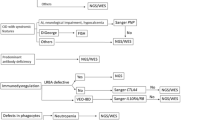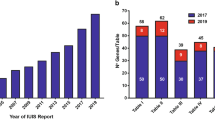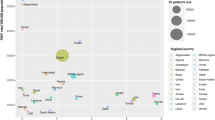Abstract
Purpose
Genetic testing provides great support to validate the clinical diagnosis of inborn errors of immunity (IEI). However, the high cost and advanced technology make these tests inaccessible to a large proportion of patients in low-income countries. In the present study, we aim to evaluate the Moroccan experience in genetic testing and to report the main molecular features and difficulties encountered in genetic diagnosis.
Methods
We performed a multi-center retrospective analysis of all patients with a molecular diagnosis and registered in the national registry between 2010 and 2022. To estimate the impact of the newly identified mutations, we calculated the Combined Annotation Dependent Depletion (CADD) score and the mutation significance cutoff (MSC) for each variant.
Results
A total of 216 (29%) patients received a genetic diagnosis out of 742 patients with IEI included in the registry. All genetic tests were performed in the context of thesis projects (40%) or international collaborations (60%). A set of 55 genetic defects were identified, including 7 newly reported: SNORA31, TBX21, SPPL2A, TYK2, RLTPR, ZNF341, and STAT2 GOF. Genetic diagnoses were more frequent in the defects of innate and intrinsic immunity with a percentage of 78%, while antibody deficiencies had a lower frequency with a percentage of 17.5%. Only one genetic diagnosis has been made in the complement deficiency group. The most commonly used molecular techniques were Sanger sequencing (37%) followed by targeted gene sequencing (31%).
Conclusion
The thesis projects and collaborations were beneficial as they allowed us to provide a definitive genetic diagnosis to 29% of the patients and to contribute to the identification of new genetic defects and mutations. These results offer insight into the progress made in genetic diagnoses of IEI in Morocco, which would provide a baseline for improving the clinical management of patients with IEI.

Similar content being viewed by others
Data Availability
The datasets generated during and/or analyzed during the current study are available from the corresponding author on reasonable request.
References
Bousfiha A, Moundir A, Tangye SG, et al. The 2022 update of IUIS phenotypical classification for human inborn errors of immunity. J Clin Immunol. https://doi.org/10.1007/s10875-022-01352-z
Tangye SG, Al-Herz W, Bousfiha A, et al. Human inborn errors of immunity: 2022 update on the classification from the international union of immunological societies expert committee. J Clin Immunol. 2022;24:1–35.
Tangye SG, Al-Herz W, Bousfiha A, et al. The ever-increasing array of novel inborn errors of immunity: an interim update by the IUIS committee. J Clin Immunol. 2021;41(3):666–79.
Casanova JL, Abel L. The human genetic determinism of life-threatening infectious diseases: genetic heterogeneity and physiological homogeneity? Hum Genet. 2020;139(6–7):681–94.
Kircher M, Witten DM, Jain P, O’Roak BJ, Cooper GM, Shendure J. A general framework for estimating the relative pathogenicity of human genetic variants. Nat Genet. 2014;46(3):310–5. https://doi.org/10.1038/ng.2892.
Itan Y, Shang L, Boisson B, et al. The mutation significance cutoff: gene-level thresholds for variant predictions. Nat Methods. 2016;13(2):109–10. https://doi.org/10.1038/nmeth.3739.
Lafaille FG, Harschnitz O, Lee YS, et al. Human SNORA31 variations impair cortical neuron-intrinsic immunity to HSV-1 and underlie herpes simplex encephalitis. Nat Med. 2019;25(12):1873–84. https://doi.org/10.1038/s41591-019-0672-3.
Yang R, Mele F, Worley L, et al. Human T-bet governs innate and innate-like adaptive IFN-γ immunity against mycobacteria. Cell. 2020;183(7):1826-1847.e31.
Kong XF, Martinez-Barricarte R, Kennedy J, et al. Disruption of an antimycobacterial circuit between dendritic and helper T cells in human SPPL2a deficiency. Nat Immunol. 2018;19(9):973–85.
Kreins AY, Ciancanelli MJ, Okada S, et al. Human TYK2 deficiency: mycobacterial and viral infections without hyper-IgE syndrome. J Exp Med. 2015;212(10):1641–62.
Wang Y, Ma CS, Ling Y, et al. Dual T cell- and B cell-intrinsic deficiency in humans with biallelic RLTPR mutations. J Exp Med. 2016;213(11):2413–35. https://doi.org/10.1084/jem.20160576.
Béziat V, Li J, Lin JX, et al. A recessive form of hyper-IgE syndrome by disruption of ZNF341-dependent STAT3 transcription and activity. Sci Immunol. 2018;3(24):eaat4956.
Gruber C, Martin-Fernandez M, Ailal F, et al. Homozygous STAT2 gain-of-function mutation by loss of USP18 activity in a patient with type I interferonopathy. J Exp Med. 2020;217(5):e20192319.
Barbouche M-R, Galal N, Ben-Mustapha I, Jeddane L, Mellouli F, Ailal F, et al. Primary immunodeficiencies in highly consanguine ous North African populations. Ann N Y Acad Sci. 2011;1238:42–52.
Bousfiha AA, Errami A, Jeddane L, et al. Primary immunodeficiencies: epidemiology in the Maghreb. Tunis Med. 2018;96(10–11):672–7.
Mahlaoui N, Picard C, Bach P, et al. Genetic diagnosis of primary immunodeficiencies: a survey of the French national registry. J Allergy Clin Immunol. 2019;143(4):1646-1649.e10.
Meyts I, Bosch B, Bolze A, et al. Exome and genome sequencing for inborn errors of immunity. J Allergy Clin Immunol. 2016;138(4):957–69.
Mahlaoui N, Jais JP, Brosselin P, et al. Prevalence of primary immunodeficiencies in France is underestimated. J Allergy Clin Immunol. 2017;140(6):1731–3.
Casanova JL, Conley ME, Seligman SJ, Abel L, Notarangelo LD. Guidelines for genetic studies in single patients: lessons from primary immunodeficiencies. J Exp Med. 2014;211(11):2137–49.
Bustamante J. Mendelian susceptibility to mycobacterial disease: recent discoveries. Hum Genet. 2020;139(6–7):993–1000.
Kadlub N, Sessiecq Q, Mandavit M, et al. Molecular and cellular characterizations of human cherubism: disease aggressiveness depends on osteoclast differentiation. Orphanet J Rare Dis. 2018;13(1):166.
Wiszniewski W, Fondaneche MC, Lambert N, et al. Founder effect for a 26-bp deletion in the RFXANK gene in North African major histocompatibility complex class II-deficient patients belonging to complementation group B. Immunogenetics. 2000;51(4–5):261–7.
Baghad B, El Fatoiki FZ, Benhsaien I, et al. Pediatric demodicosis associated with gain-of-function variant in STAT1 presenting as rosacea-type rash. J Clin Immunol. 2021;41(3):698–700.
Baghad B, Benhsaien I, El Fatoiki FZ, et al. Candidose cutanéo-muqueuse chronique avec mutation gain-de-fonction du gène STAT1 associée à des infections herpétiques et à mycobactérie [Chronic mucocutaneous candidiasis with STAT1 gain-of-function mutation associated with herpes virus and mycobacterial infections]. Ann Dermatol Venereol. 2020;147(1):41–5.
Author information
Authors and Affiliations
Contributions
A. Moundir wrote the manuscript, prepared the tables and figures, and interpreted the data. L. Jeddane revised the manuscript and provided critical feedback. A. A. Bousfiha designed the study, participated in data interpretation, revised the manuscript, and provided critical feedback. The other co-authors provided the data. All authors read and approved the final manuscript.
Corresponding author
Ethics declarations
Ethics Approval
This is an observational study. The National Research Ethics Committee has confirmed that no ethical approval is required.
Consent to Participate
Not applicable.
Consent for Publication
Not applicable.
Conflict of Interest
The authors declare no competing interests.
Additional information
Publisher's Note
Springer Nature remains neutral with regard to jurisdictional claims in published maps and institutional affiliations.
Rights and permissions
Springer Nature or its licensor (e.g. a society or other partner) holds exclusive rights to this article under a publishing agreement with the author(s) or other rightsholder(s); author self-archiving of the accepted manuscript version of this article is solely governed by the terms of such publishing agreement and applicable law.
About this article
Cite this article
Moundir, A., Ouair, H., Benhsaien, I. et al. Genetic Diagnosis of Inborn Errors of Immunity in an Emerging Country: a Retrospective Study of 216 Moroccan Patients. J Clin Immunol 43, 485–494 (2023). https://doi.org/10.1007/s10875-022-01398-z
Received:
Accepted:
Published:
Issue Date:
DOI: https://doi.org/10.1007/s10875-022-01398-z




